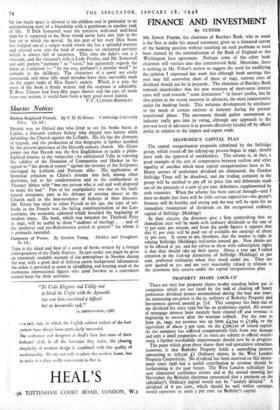FINANCE AND INVESTMENT
By CUSTOS
Mn. EDWIN FISHER, the chairman of Barclays Bank, who as usual is the first to make his annual statement, gives us a balanced survey. of the banking position without touching on such problems as have been created by the nationalisation of the Bank of England or the Washington loan agreement. .Perhaps some of the other bank chairmen will venture into this controversial field. Meantime, there is nothing in Mr. Fisher's review to suggest the need for modifying the opinion I expressed last week that although bank earnings this year may fall somewhat short of those of 1945, current rates of dividend should not be in jeopardy. The chairman of Barclays Bank reminds shareholders that the new structure of short-term interest rates will tend towards "some diminution" in future profits, but he also points to the recent recovery in advances, the most remunerative outlet for banking funds. This welcome development he attributes to the needs of certain sections of industry during the present transitional phase. The movement should gather momentum as industry really gets into its swing, although any approach to the pre-war level of advances is at present effectively headed off by official policy .in relation to the import and export trade.
SELFRIDGE'S CAPITAL PLAN The capital reorganisation proposals submitted by the Selfridge group, which round off the tidying-up process begun in 194r, should meet with the approval of stockholders. The scheme is, in fact, a good example of the sort of compromise between realism and strict equality of sacrifice which most capital reorganisations have to be. Heavy arrears of preference dividend are eliminated, the Gordon Selfridge Trust will be dissolved, and the trading company in the group will be enabled to pay off its prior lien and debenture stock out of the proceeds of a new 31 per cent. debenture, supplemented by cash resources. When the scheme has been carried through—and I have no doubt that there will be little serious opposition—the group's finances will be healthy and strong and the way will be open for an immediate resumption of dividends on the reorganised ordinary capital of Selfridge (Holdings).
In their circular the directors give a firm undertaking that an immediate start will be made with ordinary dividends at the rate of 71 per cent, per annum- and from the profit figures it appears that this 71 per cent. will-be paid out of available net earnings of about 15 per ,cent. It seems to me, therefore, that the market is right in valuing Selfridge (Holdings) ordinaries around 40s. New shares -are to be offered at 30s. and my advice to those with subscription tights is that they should take up their quota. About a year ago I called attention to the lock-up attractions of Selfridge (Holdings) io per cent. preferred ordinaries when they, stood under 20s. They are now quoted at 32s. and are very reasonably valued in relation to the treatment they receive under the capital reorganisation plan.
PROPERTY SHARE LOCK-UP There are very few property shares to-day standing below par in companies which are not faced by the task of clearing off heavy preference dividend arrears accumulated during the lean war years. An interesting exception is the 5s. ordinary of Berkeley Property and • Investment quoted around 4s. 71d. This company has been out of the dividend list since 1939 but has no preference capital. All arrears of mortgage interest have recently been cleared off and revenue is beginning to recover' after the wartime setback. For the year to June 30, 1945, net revenue was up from £4,344 to £7,984, or the equivalent, of about 3 per cent, on the £506,250 of issued capital. As the company has suffered comparatively little from war damage and only a small proportion of its rents are subject to official restric- tions a further worthwhile improvement should now be in progress. The point which gives these shares their real speculative attraction. however, is that Berkeley Property holds a controlling interest, amounting to 256,520 Li Ordinary shares, in the West London Property Corporation. No dividend has been received on this invest- ment since 1938 but a useful contribution to revenue should be forthcoming in the near future. The 'West London subsidiary has now eliminated preference arrears and at the annual- Meeting last November the Berkelek chairman announced that a payment on the subsidiary's Ordinary capital would not be "unduly delayed." A dividend of 6 per cent, which should be well within earnings, would represent an extra 3 per cent. on Berkeley's capital.


























 Previous page
Previous page